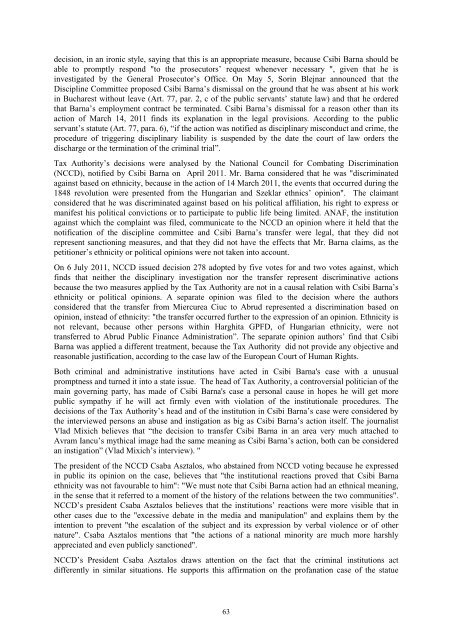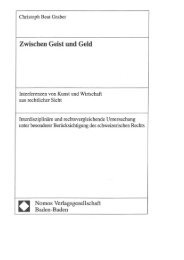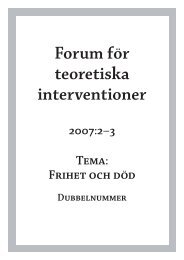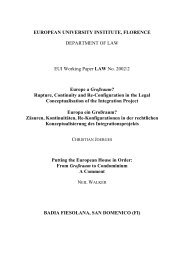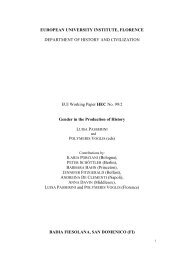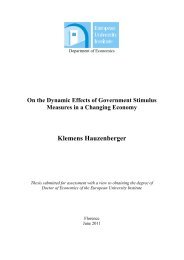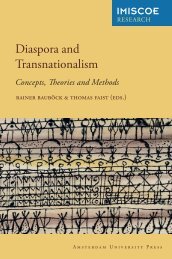Sinziana-Elena Poiana Ioana Lupea Irina-Madalina Doroftei Alina ...
Sinziana-Elena Poiana Ioana Lupea Irina-Madalina Doroftei Alina ...
Sinziana-Elena Poiana Ioana Lupea Irina-Madalina Doroftei Alina ...
Create successful ePaper yourself
Turn your PDF publications into a flip-book with our unique Google optimized e-Paper software.
decision, in an ironic style, saying that this is an appropriate measure, because Csibi Barna should be<br />
able to promptly respond "to the prosecutors’ request whenever necessary ", given that he is<br />
investigated by the General Prosecutor’s Office. On May 5, Sorin Blejnar announced that the<br />
Discipline Committee proposed Csibi Barna’s dismissal on the ground that he was absent at his work<br />
in Bucharest without leave (Art. 77, par. 2, c of the public servants’ statute law) and that he ordered<br />
that Barna’s employment contract be terminated. Csibi Barna’s dismissal for a reason other than its<br />
action of March 14, 2011 finds its explanation in the legal provisions. According to the public<br />
servant’s statute (Art. 77, para. 6), “if the action was notified as disciplinary misconduct and crime, the<br />
procedure of triggering disciplinary liability is suspended by the date the court of law orders the<br />
discharge or the termination of the criminal trial”.<br />
Tax Authority’s decisions were analysed by the National Council for Combating Discrimination<br />
(NCCD), notified by Csibi Barna on April 2011. Mr. Barna considered that he was "discriminated<br />
against based on ethnicity, because in the action of 14 March 2011, the events that occurred during the<br />
1848 revolution were presented from the Hungarian and Szeklar ethnics’ opinion". The claimant<br />
considered that he was discriminated against based on his political affiliation, his right to express or<br />
manifest his political convictions or to participate to public life being limited. ANAF, the institution<br />
against which the complaint was filed, communicate to the NCCD an opinion where it held that the<br />
notification of the discipline committee and Csibi Barna’s transfer were legal, that they did not<br />
represent sanctioning measures, and that they did not have the effects that Mr. Barna claims, as the<br />
petitioner’s ethnicity or political opinions were not taken into account.<br />
On 6 July 2011, NCCD issued decision 278 adopted by five votes for and two votes against, which<br />
finds that neither the disciplinary investigation nor the transfer represent discriminative actions<br />
because the two measures applied by the Tax Authority are not in a causal relation with Csibi Barna’s<br />
ethnicity or political opinions. A separate opinion was filed to the decision where the authors<br />
considered that the transfer from Miercurea Ciuc to Abrud represented a discrimination based on<br />
opinion, instead of ethnicity: "the transfer occurred further to the expression of an opinion. Ethnicity is<br />
not relevant, because other persons within Harghita GPFD, of Hungarian ethnicity, were not<br />
transferred to Abrud Public Finance Administration”. The separate opinion authors’ find that Csibi<br />
Barna was applied a different treatment, because the Tax Authority did not provide any objective and<br />
reasonable justification, according to the case law of the European Court of Human Rights.<br />
Both criminal and administrative institutions have acted in Csibi Barna's case with a unusual<br />
promptness and turned it into a state issue. The head of Tax Authority, a controversial politician of the<br />
main governing party, has made of Csibi Barna's case a personal cause in hopes he will get more<br />
public sympathy if he will act firmly even with violation of the institutionale procedures. The<br />
decisions of the Tax Authority’s head and of the institution in Csibi Barna’s case were considered by<br />
the interviewed persons an abuse and instigation as big as Csibi Barna’s action itself. The journalist<br />
Vlad Mixich believes that “the decision to transfer Csibi Barna in an area very much attached to<br />
Avram Iancu’s mythical image had the same meaning as Csibi Barna’s action, both can be considered<br />
an instigation” (Vlad Mixich’s interview). "<br />
The president of the NCCD Csaba Asztalos, who abstained from NCCD voting because he expressed<br />
in public its opinion on the case, believes that "the institutional reactions proved that Csibi Barna<br />
ethnicity was not favourable to him": "We must note that Csibi Barna action had an ethnical meaning,<br />
in the sense that it referred to a moment of the history of the relations between the two communities".<br />
NCCD’s president Csaba Asztalos believes that the institutions’ reactions were more visible that in<br />
other cases due to the "excessive debate in the media and manipulation" and explains them by the<br />
intention to prevent "the escalation of the subject and its expression by verbal violence or of other<br />
nature". Csaba Asztalos mentions that "the actions of a national minority are much more harshly<br />
appreciated and even publicly sanctioned".<br />
NCCD’s President Csaba Asztalos draws attention on the fact that the criminal institutions act<br />
differently in similar situations. He supports this affirmation on the profanation case of the statue<br />
63


